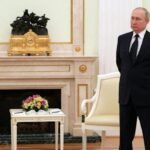
The situation in North Korea long has been worrying to those concerned about potentially capricious military actions on the part of paranoid authoritarian regimes. But COVID-19 is presenting new concerns, both to the people of North Korea and the world beyond.
Last week, the isolated nation confirmed an outbreak of COVID-19 omicron cases for the first time and state media featured a masked Kim Jong Un. Previously, North Korea said it had prevented any outbreak, although that has not been independently verified. But that position dissolved when a lockdown was called for Pyongyang, and potentially beyond, on May 11.
North Korea has not vaccinated its ordinary population nor does it have adequate COVID-19 testing equipment. The country had refused offers of vaccine help from South Korea and even China, although there were reports Wednesday of a softening of that position, at least in regards to China.
Some closer observers have argued that secretive North Korea didn’t like the so-called COVAX program of the United Nations due to its reporting requirements, which would have meant international monitors entering the nation.
The world has had painful experience of what happens when the COVID-19 virus enters an unvaccinated population. That explains the current global concern for ordinary North Koreans who live in a country known to have limited access to health care, especially in its rural regions.
The virus (known as “the fever” in North Korea) does not care about national borders, ideologies or any other such divisions. North Korean leadership should swallow its pride while there is still time and acquire what vaccination and therapeutic supplies it can, from wherever it can.
Other nations have a vested interest in persuading North Korea to face up to current realities. Our experience with COVID-19 teaches us that where there are new infections, new variants follow. These variants then travel, potentially causing new infections far from the source of their creation.
We’re not going to change the ways of this regime overnight. But the Biden administration and others could amp up their expressed willingness to deliver COVID-19 vaccines, perhaps with fewer questions asked than usual. At this point, that looks like the best hope of evading a potentially horrific crisis in a country that struggles to feed its people in the best of times.
By closing itself off yet further from the global community during COVID-19, North Korea already has caused widespread hunger within its own borders. Add to that issue a lockdown, supply problems and a rising tide of new infections and the prescription is for human misery, potentially on a scale that country has never seen.
The time for all sides to act is now. The West should not let issues with the regime cloud the humanitarian crisis. And Kim should at least restore relations with South Korean President Yoon Seok-youl sufficiently to allow his people the benefit of help.
Kim didn’t cause the virus and he should feel no shame in harnessing the full power of humanity’s efforts to date to thwart its rampages. And that includes accepting aid from the U.S., which should work to allow Kim to save face, if it means helping his people and averting what could be an unparalleled humanitarian disaster of starvation and infection.
The Korean Central News Agency has propagandized that “the single-minded public unity is the most powerful guarantee that can win in this anti-pandemic fight.”
We have a better suggestion for the Supreme Leader: thinking globally and guaranteeing the prompt acquisition and distribution of vaccines and antiviral medications.
Join the discussion on Twitter @chitribopinions and on Facebook.
Submit a letter, of no more than 400 words, to the editor here or email letters@chicagotribune.com.




